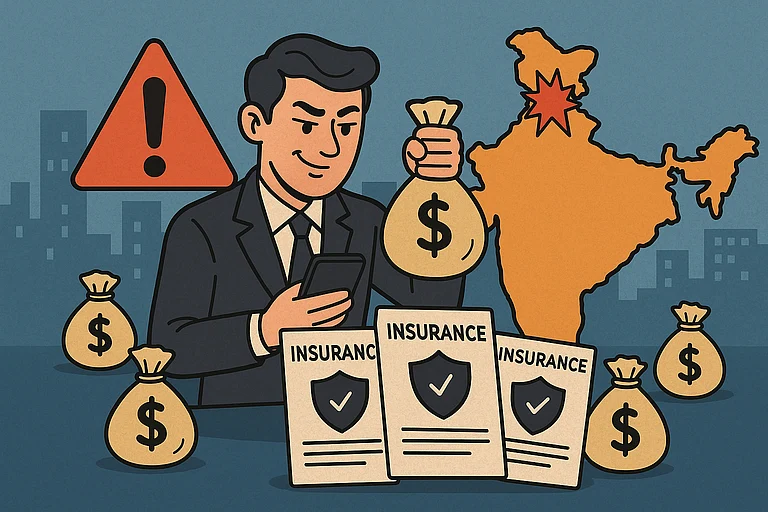As more people fall victim to cyber fraud with our interactions and transactions moving online, Tapan Singhel, managing director and chief executive officer of Bajaj Allianz General Insurance, explains the nuances of cyber insurance and whether it has become a must-have cover. Here are edited excerpts from an interview with Outlook Money.
With An Increase In Per Capita Income, Demand For Cyber Insurance Would Rise
Awareness, as well as a rise in income, will increase the penetration of cyber insurance, says Tapan Singhel, managing director and chief executive officer of Bajaj Allianz General Insurance
Cyber fraud has increased dramatically, yet cyber insurance is not as popular as other policies. Is taking cyber insurance important in today's age?
When I first started working, my biggest worry about financial loss was carrying my monthly salary home on public transport, as pick-pocketing was rampant then. If there had been insurance for pick-pocketing, I would have definitely purchased it, and I'm sure most of us in that era would have bought it.
Times have changed. Today, your cash is in your phone and laptop. You have to swipe your card or use Unified Payments Interface (UPI) to pay. Now, pick-pocketing is replaced by phishing, malware, and cyber extortion. There are policies covering these risks.
I think the issue is about people being aware of it; I would be surprised if people would not buy after being aware. We were the first company to launch a retail cyber cover in India, and my daughters purchased the company's first two policies. This policy even provides coverage for the cost of legal action, if someone is stalking you and you need to file a police complaint. It is a very comprehensive cover and I strongly recommend it.
What are the risks and costs that a cyber insurance policy covers?
It covers every scenario you come across in newspapers, such as falling victim to phishing when someone sends you a suspicious link, which results in unauthorised access to your accounts and you losing the money. It also protects against malware locking your system, cyber extortion, identity theft, and liability arising from someone hacking your account.
It is very reasonably priced. If you look at the cost in relation to the risk it covers, you should have that. Cybercrimes have become rampant, but I don't hear about pickpocketing nowadays. It's cyber pick-pocketing now.
How does one decide the sum insured for cyber insurance?
When determining the sum insured by a policy, I assess the potential transaction risks, especially for UPI accounts, and estimate the maximum probable loss. In such a case, I'll try to look for a sum insured close to that and then assess the cost for that sum insured. For example, if I have to report a stalking incident, how much will I have to pay for a lawyer? Or if I have a legal liability from identity theft, what is the amount of compensation that I'll have to give? So I try to assess that, see the cost of that sum insured, balance the two, and purchase the policy.
Is it like adding up all your fixed deposits, your credit card limits, and so on?
Probable maximum loss operates in an interesting way. Let us say you have a factory worth Rs 10,000 crore. Typically, someone might think you need to insure the whole factory for Rs 10,000 crore. But if the factory has different units spread far apart, the probable maximum loss might not be Rs 10,000 crore. Maybe two units are close by, and they can go off together. So your probable maximum losses are two units, not the full factory.
Similarly, your entire fixed deposit will not be the probable maximum loss. The maximum loss that can happen in a particular incident, like phishing or malware targeting, is based on the amount of money in the account linked to your UPI. It is fun doing this analysis and realising your risk. And maybe you can mitigate the risk in your own way by lessening the amount you have in the account linked to the UPI.
Do you think more awareness will create more demand?
Yes, it will. And we have seen that. I think the inflection point for insurance is very interesting. As the per capita income rises, the inflection point of insurance penetration starts.
When you are worried about 'Roti Kapda Makan', then you are not worried about insurance; you are worried about survival. As you move up the income ladder, asset creation occurs, and you have more surplus money. That is where insurance starts coming into play from your recall perspective.
When I was young, I hardly had any money to lose. So, if somebody told me to buy cyber insurance, I would think: "What can the scamsters take away from me?" But today, I see youngsters with a substantial amount of money, and it's a big risk for them. So, insurance penetration would move up, and a country's economic growth would have a direct impact on the growth of the insurance industry. Products like this will have greater acceptability and greater penetration.
Would you also recommend it for senior citizens? Many times, they sit on huge corpuses after retirement and are at risk of cyber fraud.
I strongly recommend that they buy cyber insurance. My father lost some money in a phishing attack. Senior citizens are tech-savvy and love tech. It's a myth that they don't love tech. My father uses e-commerce more than I do. I think I have to refer it to them. When they understand, they use it well. I would strongly recommend them to have a good cover.
So, is it a must-have cover?
Yes, it is a must-have cover. That's the best way to put it.
Transcribed by Aaron Varghese Charly


